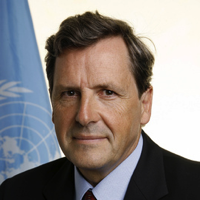This week, Alain Le Roy, U.N. undersecretary-general for peacekeeping operations, announced that he will stand down in August. Known as a generous man with a healthy distaste for the U.N.'s bureaucratic politics, the former French diplomat will have served for three years. Over that time, he has helped navigate U.N. operations through tough times, from a disaster in the Democratic Republic of the Congo (DRC) to an unlikely success in Côte d'Ivoire.
When Le Roy joined Secretary-General Ban Ki-moon's team in the summer of 2008, he faced multiple bureaucratic and operational challenges. His predecessor, Jean-Marie Guéhenno, had worked with Kofi Annan to rebuild U.N. peacekeeping after the fiasco of the 1990s, resulting in a remarkable growth in U.N. operations. The organization commanded 70,000 troops and police officers worldwide, a number that has risen to 100,000 on Le Roy's watch.
Guéhenno, who enjoyed huge respect in the U.N.'s Department of Peacekeeping Operations (DPKO), had been frank about the fact that the blue helmets were overstretched. The political and military weaknesses of the organization's deployments were painfully revealed just months after Le Roy's arrival, when rebel militiamen outmaneuvered peacekeepers in the eastern Congo, forcing hundreds of thousands of civilians to flee.

